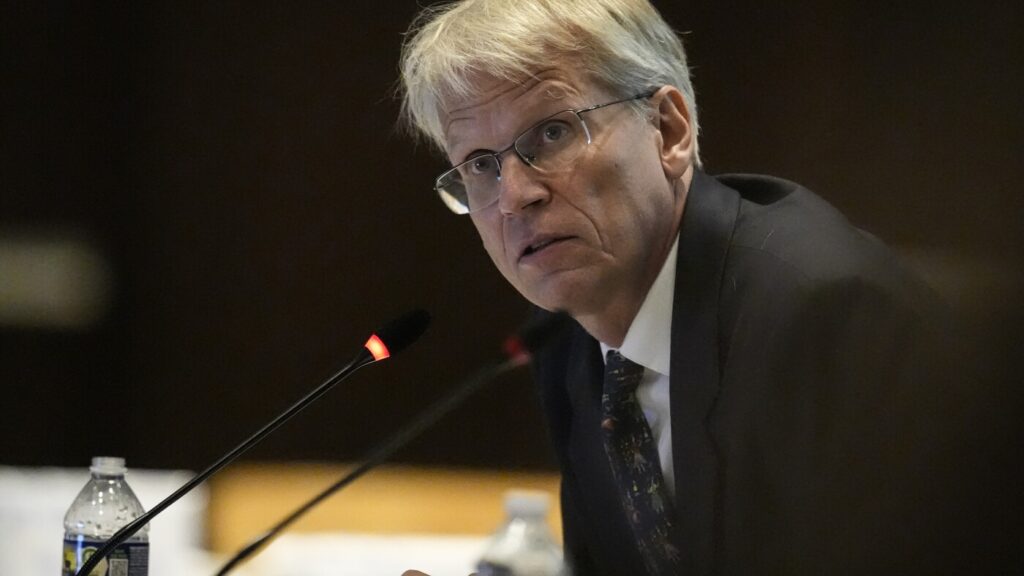
Dr. Martin Kulldorf speaks during a meeting of the Advisory Committee in Immunization Practices at the CDC, Wednesday, June 25, 2025, in Atlanta. (AP Photo/Mike Stewart)
In a significant shift in U.S. vaccine policy, a newly reconstituted federal panel, appointed by Secretary of Health and Human Services Robert F. Kennedy Jr., has announced plans to reevaluate the safety of the childhood vaccine schedule. This decision was unveiled during the Advisory Committee on Immunization Practices’ (ACIP) inaugural meeting with its new members at the Centers for Disease Control and Prevention headquarters in Atlanta.
The move comes as Kennedy, who recently replaced all 17 members appointed by President Joe Biden with his own selections, aims to address what he describes as longstanding concerns over vaccine safety and public trust in federal health institutions. The committee, known for advising the CDC on national vaccine schedules, has become a focal point of controversy, particularly with the inclusion of members who have previously disseminated misleading information about COVID-19 vaccines.
New Workgroup to Examine Vaccine Schedule
Martin Kulldorff, the newly appointed ACIP chair and a former Harvard Medical School epidemiologist, emphasized the need to “rebuild public trust” following the pandemic and what he terms “inflated promises” regarding COVID-19 vaccines and mandates. As part of this effort, ACIP will form a new workgroup dedicated to studying the cumulative effects of the recommended vaccine schedule for children.
This workgroup will focus on several aspects, including the interaction effects between different vaccines, the total number of vaccines administered, cumulative amounts of vaccine ingredients, and the timing of vaccinations. Kulldorff noted,
“The number of vaccines that our children and adolescents receive today exceed what children in most other developed nations receive and what most of us in this room received when we were children.”
Reevaluation of Older Vaccines
In addition to the new workgroup on vaccine schedules, another group will review vaccines that have not been examined in more than seven years. This includes the universal recommendation for administering the hepatitis B vaccine at birth and the immunization schedule for measles, mumps, rubella, and varicella (chickenpox). The timing of the measles vaccine will also be reassessed to address religious objections from some parents.
These initiatives have raised concerns among vaccine experts about the future direction of ACIP. Jason Schwartz, an associate professor at the Yale School of Public Health, remarked,
“They’re signaling interest in revisiting long-settled questions around vaccine safety, opening up issues that have been focal points of critics of vaccines for decades and giving them the legitimacy that comes with this previously well-respected government advisory committee.”
Controversy and Conflicts of Interest
Kennedy’s decision to overhaul ACIP stems from his claims of conflicts of interest compromising the committee’s integrity. However, an NPR investigation found that a government report often cited by Kennedy does not support these claims. Despite this, Kennedy’s appointees, including Kulldorff and Dr. Robert Malone, have faced scrutiny for their involvement in litigation against vaccine manufacturers like Merck. Both have stated they have no conflicts of interest regarding the topics discussed at the meeting.
Malone explained that he underwent “three months of vetting and training” and that any potential conflicts of interest were “declared lacking” by the Department of Health and Human Services and CDC. This suggests that Kennedy’s overhaul of ACIP may have been planned well in advance, despite the recent appointment of new committee members.
Implications and Future Directions
During the meeting, CDC scientists presented data on COVID-19 and its vaccines, challenging recent decisions by Kennedy and the Trump administration to remove recommendations for vaccinating healthy children and pregnant women. A slide summarizing epidemiological data revealed that most hospitalized children under the age of 2 had no underlying medical conditions, with severe outcomes for 1 in 4 admitted to intensive care units. The data also highlighted the vulnerability of children under 6 months, who rely on maternal antibodies due to the lack of approved vaccines for this age group.
The reconstitution of ACIP and its new focus areas signal a potential shift in U.S. vaccine policy, with implications for public health and vaccine trust. As the committee continues its work, the outcomes of these evaluations could influence future vaccine recommendations and public perceptions of vaccine safety.






